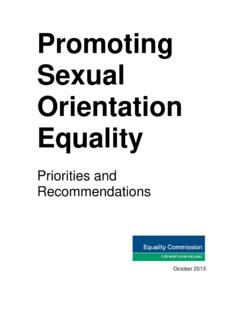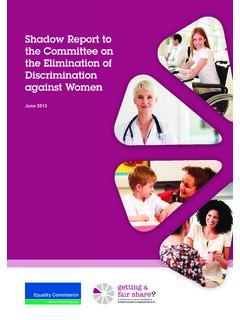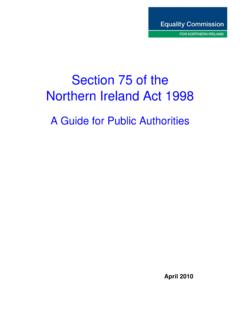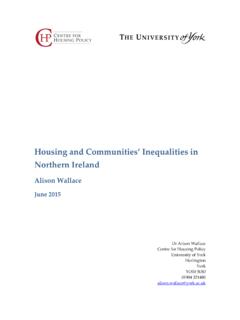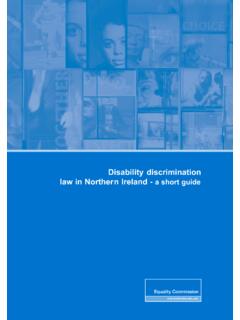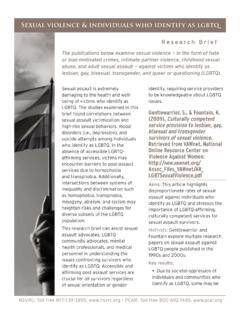Transcription of Section 75 of the Northern Ireland Act 1998
1 Section 75 of the Northern Ireland Act 1998 A Guide for Public Authorities April 2010 2 3 Further information and advice For further information and advice on equality issues or if you would like to find out more about the Equality Commission and its work, contact us at: Equality Commission for Northern Ireland Equality House 7-9 Shaftesbury Square Belfast BT2 7DP Telephone: 028 90 890 890 (Enquiry Line) Fax: 028 90 315 993 Textphone: 028 90 500 589 Email: Website: ISBN 978-1-906414-25-2 April 2010 4 Contents Introduction ..5 Chapter 1 Section 75 of the Northern Ireland Act 1998 the statutory duties ..7 Chapter 2 What are public authorities required to do? .. 11 Chapter 3 Role of the Equality Commission for Northern Ireland .. 17 Chapter 4 Complaints and investigations .. 20 Chapter 5 Scope of the legislation .. 24 Chapter 6 Form and key elements of an equality 32 Chapter 7 Elements of an equality scheme.
2 35 Chapter 8 Action measures .. 46 Annex 1 Screening .. 51 Appendix 1 Screening flowchart and 58 Appendix 2 Northern Ireland Act 1998, Section 75 .. 74 Appendix 3 Northern Ireland Act 1998, Schedule 9 .. 76 Appendix 4 Glossary of terms .. 82 Appendix 5 Where to go for help .. 90 5 Introduction to the Revised Guide to the statutory duties Section 75 of the Northern Ireland Act 1998 was intended to be transformative. Its aim was to change the practices of government and public authorities so that equality of opportunity and good relations are central to policy making, policy implementation, policy review and service delivery. The Equality Commission for Northern Ireland (the Commission) is fully committed to ensuring and monitoring the effective implementation of the Section 75 statutory duties. The decision to review and revise the Guide to the Statutory Duties1 (the Guide) is a reflection of this commitment and follows the conclusion of the Section 75 Effectiveness Review2 which the Commission undertook between 2006-2008, in order to assess the effectiveness of the legislation.
3 The final report of the Effectiveness Review was published in November 2008. The Effectiveness Review enabled the Commission to take stock of progress on the implementation of Section 75 and to ascertain if Section 75 was delivering on its intention that equality of opportunity and good relations should be central to public policy development. The Effectiveness Review s recommendations have influenced the direction and informed the content of this new revised Guide (Revised April 2010). Following the Effectiveness Review recommendations, the Commission s aim was to create a more user friendly Guide, to make improvements in the area of screening of policies and to shift the focus within public authorities from concentrating primarily on the process of implementing Section 75, towards achieving outcomes within the Section 75 framework. The revised Guide also takes account of the experience to date of public authorities and groups affected by the duties, and their suggested improvements.
4 It reflects the need to move forward with the implementation of the Section 75 statutory duties, whilst learning from experience. Explanatory notes Chapters 1, 2, 3, 4 and 8 provide some general information about the Section 75 statutory duties, what is required from public authorities, who is responsible for implementing and overseeing them, and the role of the Commission. These chapters are intended to outline the context of the Section 75 statutory duties and provide an overview of the duties themselves 1 Equality Commission for Northern Ireland (2004). Guide to the Statutory Duties 2 Equality Commission for Northern Ireland (November 2008). Keeping it Effective: Reviewing the Effectiveness of Section 75 of the Northern Ireland Act 1998 Final Report. 6to help public authorities understand what is required of them (Green Section ). Schedule 9 of the Northern Ireland Act 19983 directs that a public authority s equality scheme shall conform to any Guidelines as to form and content which are issued by the Commission with the approval of the Secretary of State.
5 Chapters 5, 6 and 7 of this Guide (the Blue Section ) constitute the Guidelines as to form and content of an equality scheme as per the requirements of Schedule 9. 3 Northern Ireland Act 1998. Schedule 9, Paragraph 4 (3) (a). 7 Chapter 1 Section 75 of the Northern Ireland Act 1998 the statutory duties Section 75 of the Northern Ireland Act 1998 (the Act) requires public authorities designated4 for the purposes of the Act to comply with two statutory duties. The first duty is the Equality of Opportunity duty, which requires public authorities in carrying out their functions relating to Northern Ireland to have due regard to the need to promote equality of opportunity between the nine equality categories of persons of different religious belief, political opinion, racial group, age, marital status or sexual orientation ; men and women generally; persons with a disability and persons without; and persons with dependants and persons without.
6 The second duty, the Good Relations duty, requires that public authorities in carrying out their functions relating to Northern Ireland have regard to the desirability of promoting good relations between persons of different religious belief, political opinion and racial group. Background to the statutory duties The duties on public authorities to promote equality of opportunity and good relations grew out of attempts to make the earlier non-statutory Policy Appraisal and Fair Treatment (PAFT)5 initiative more effective, and from the agreement reached in the multi-party talks on Northern Ireland , that is The Belfast Agreement/Good Friday Agreement (the Agreement)6 . In the report of its Review of Employment Equality7, the Standing Advisory Commission on Human Rights (SACHR)8 highlighted the dissatisfaction in many quarters with the PAFT Guidelines. SACHR recommended significant strengthening of the process of mainstreaming equality, including a recommendation that PAFT be put on a statutory basis with a statutory obligation on the public sector to promote full and effective equality.
7 In its White Paper Partnership for Equality 9, Government responded positively to 4 Designation is explained in chapter 5, page 26 of this Guide. 5 Central Secretariat circular 5/93 (December 1993). Policy Appraisal and Fair Treatment. 6 Agreement between the Government of the United Kingdom of Great Britain and Northern Ireland and the Government of Ireland (10 April 1998). 7 SACHR (1997) Employment Equality: Building for the Future (The Stationery Office, London, ISBN 0-10-136842-9). 8 Standing Advisory Commission on Human Rights - body established under the Northern Ireland Constitution Act 1973. 9 Partnership for Equality White Paper (The Stationery Office, London, 1998, ISBN 070-138902-7). 8some of SACHR s recommendations, including introducing statutory equality mainstreaming duties. Subsequently, the Rights, Safeguards and Equality of Opportunity Section of the Agreement included a commitment to introducing such a statutory duty.
8 This was followed with the introduction of new statutory duties on public authorities to mainstream equality and good relations by the Northern Ireland Act 1998 (Appendix 2). Mainstreaming The Section 75 statutory duties make equality and good relations central to the whole range of public policy decision-making. This approach is often referred to as mainstreaming . The Council of Europe10 has defined mainstreaming as: the (re)organisation, improvement, development and evaluation of policy processes, so that a[n] .. equality perspective is incorporated in all policies at all levels and at all stages, by the actors normally involved in policy-making . Mainstreaming equality and good relations is important for several reasons. Experience in Northern Ireland and elsewhere shows that questions of equality and good relations may easily become sidelined in organisations. Focused attention on mainstreaming addresses this problem by requiring all public authorities to engage directly with equality and good relations issues through all stages of policy making and service delivery.
9 Section 75 is part of the public policy agenda which is ultimately aimed at developing policies and services that address the needs of all people, especially those experiencing inequalities. Mainstreaming the Section 75 requirements of assessment of policies for impact on the promotion of equality of opportunity into other policy review timetables or policy evaluation can contribute to a joined-up approach to policy review, ensuring coherence, integration of public policy goals and ultimately better value for public money. Affirmative action and positive action The Section 75 statutory duties require more than the avoidance of discrimination. Public authorities should actively seek ways to encourage 10 Council of Europe, Strasbourg (May 1998). Gender mainstreaming conceptual framework, methodology and presentation of good practices. 9greater equality of opportunity and good relations through their policy development, for example, the kind of measures permitted under sex discrimination, race relations, and disability discrimination legislation.
10 Public authorities should give particular consideration to positive action where the impact of a policy will affect different people in a different way, for example, the impact of a policy on women or people with disabilities. Public authorities should take an approach which recognises that certain groups such as women or people with disabilities may experience higher levels of inequalities than non disabled people and men respectively. From the outset, Government made clear in the parliamentary debate on the legislation that the statutory duty concerning equality of opportunity does not deter a public authority from taking action to address disadvantage among particular sections of society: Section 75 in no way calls into question the ability of public authorities to take affirmative action in appropriate cases to correct disadvantage. Affirmative action in appropriate circumstances is an important method of combating inequality, and it is our firm intention that that should remain so.
